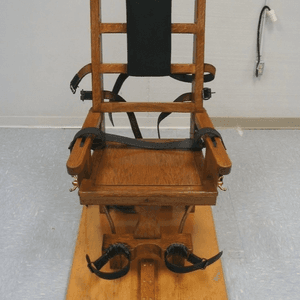
A South Carolina trial court has issued an injunction preventing the state from carrying out executions using a firing squad or the electric chair, ruling that those methods violate the state’s constitutional prohibition against “cruel, unusual, and corporal punishments.”
In a 38-page opinion issued September 6, 2022, Richland County Court of Common Pleas Judge Jocelyn Newman (pictured) opinion offered a sweeping condemnation of the state’s 2021 method-of-execution statute, which made the electric chair the state’s default method of execution and added the firing squad as a second alternative to lethal injection. The decision came following a week-long trial in a case brought by death-row prisoners Freddie Owens, Brad Sigmon, Gary Terry, and Richard Moore that challenged the constitutionality of executions by firing squad or electrocution. Relying upon expert testimony presented in that trial, Newman found that the pain and bodily mutilation caused by electrocution and firing squad were intolerable under the state constitution.
In striking down the law, Judge Newman noted that only one state in the U.S. had carried out any executions by firing squad over the past fifty years and that South Carolina was the only state to have designated the electric chair as the default method of execution. South Carolina, she declared, had “turned back the clock” and “ignored advances in scientific research and evolving standards of humanity and decency.”
A spokesperson for Governor Henry McMaster said that governor disagreed with the court’s ruling and would appeal.
South Carolina had argued to the court that it should evaluate the prisoner’s claims under the Eighth Amendment of the U.S. Constitution. Judge Newman rejected the argument, citing state supreme court case law that provided for heightened protections under the South Carolina Constitution’s ban on cruel, corporal, or unusual punishment.
The court found the firing squad to be unusual, cruel, and corporal. In evaluating whether the punishment is unusual, the court noted the rarity of such executions and that South Carolina has never conducted one. The court found the punishment to be cruel after crediting expert testimony that death by firing squad would be extremely painful because the prisoner is likely to be conscious after the fatal shot and “will feel excruciating pain resulting from the gunshot wounds and broken bones.”
The court also examined the South Carolina constitution’s bar on “corporal” punishments, which has been interpreted as prohibiting punishments that mutilate the body. After reviewing photos from the autopsy of Ronnie Lee Gardner, the last person to be executed by firing squad, the court concluded that Gardner’s body “has been, by any objective measure, mutilated.” The court relied upon testimony from South Carolina Department of Corrections (SCDC) officials and SCDC’s plan for conducting firing squad executions to further support its conclusion, writing that “SCDC certainly anticipates similar carnage, as it created a firing squad chamber that includes a slanted trough below the firing squad chair to collect the inmate’s blood and covered the walls of the chamber with a black fabric to obscure any bodily fluid or tissues that emanate from the inmate’s body.”
Like the supreme courts of Georgia and Nebraska, the court found the electric chair to violate constitutional principles. The court focused on the likelihood of “intolerable pain and suffering from electrical burns, thermal heating, oxygen deprivation, muscle tetany, and the experience of high-voltage electrocution.” The court cited trial evidence that those undergoing “electrocution continue to move, breathe, and even scream after the shock is administered” and “that a substantial percentage of individuals survive and remain sensate long enough to experience excruciating pain and suffering.” Based on this evidence and the infrequency with which the electric chair is used, the court found electrocution to be cruel, unusual, and corporal.
The court also concluded that the 2021 methods of execution statute was an unlawful ex post facto law because it made electrocution the default method of execution. Comparing lethal injection to electrocution and the firing squad, the court found that “[l]ethal injection is the least severe of the three statutorily authorized punishments, and the amended statute effectively revokes that lesser punishment.” The court also found that the statute’s provision for lethal injection only when it is “available” is impermissibly vague and unconstitutionally allows the SCDC director unbridled discretion to determine when lethal injection will be used.
Nevin Smith, Judge rules firing squads and electrocutions unconstitutional in SC, WIS TV, September 6, 2022; Amanda Shaw, SC judge says electric chair, firing squad are unconstitutional, Fox Carolina, September 6, 2022; John Monk and Maayan Schecter, SC judge rules firing squad, electrocution unconstitutional, The State, September 7, 2022; Derek Hawkins, South Carolina judge stops use of firing squad, electric chair, The Washington Post, September 7, 2022.
Read the decision in Owens v. Stirling.
Methods of Execution
Sep 10, 2024

Idaho Court Dismisses Longest-Serving Death Row Prisoner’s Post-Conviction Claim Against a Second Execution Attempt
Methods of Execution
Sep 03, 2024

Articles of Interest: The New York Times Editorial Board Argues United States “Does Not Need the Death Penalty”
Methods of Execution
Mar 11, 2024
